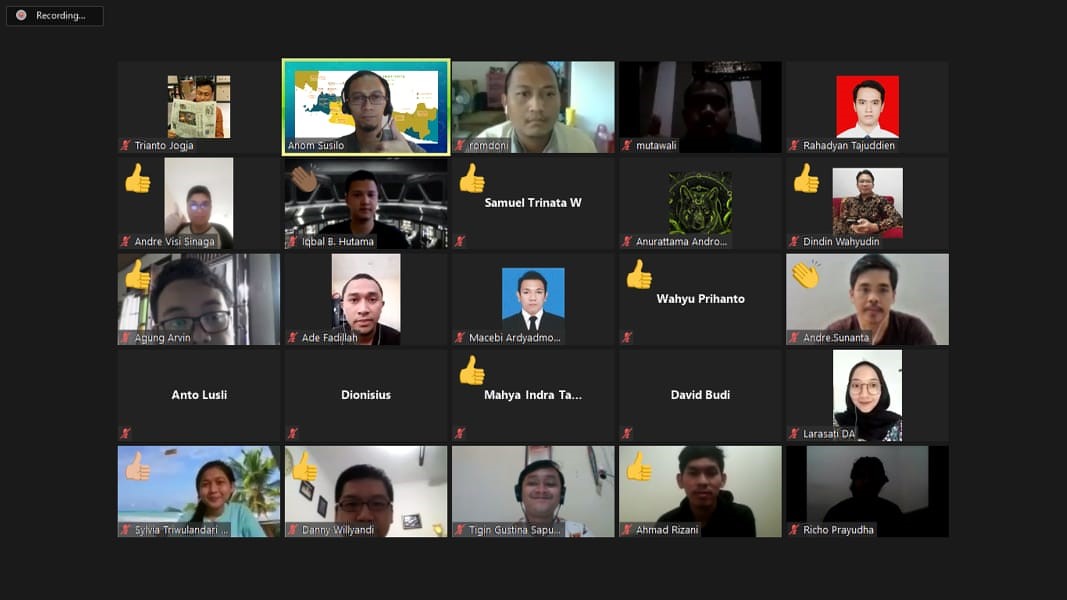Peningkatan Kapabilitas Teknologi dalam Menghadapi Era Disrupsi pada Generasi Milenial melalui Webinar
##plugins.themes.academic_pro.article.main##
Abstract
Pengabdian kepada masyarakat ini bertujuan untuk memberikan paradigma perlunya meningkatkan kapabilitas penggunaan teknologi terutama ponsel pintar pada generasi milenial. Ternyata banyak konsumen yang membeli kebutuhannya secara daring dan itu merupakan kesempatan. Permasalahan yang dihadapi oleh para generasi milenial adalah pemanfaatan ponsel pintar yang tidak maksimal karena kurangnya minat dan tidak menariknya wirausaha melalui daring. Metode pelatihan berupa pemberian materi secara daring melalui webinar, peserta dapat bertanya secara langsung tanpa perlu berkumpul. Pada akhir kegiatan dilakukan dengan sesi tanya jawab sebagai bentuk evaluasinya. Hasil setelah mengikuti pelatihan, paradigma mereka terbuka untuk memunculkan minat mereka untuk memulai usaha secara daring dengan memanfaatkan ponsel pintar mereka
##plugins.themes.academic_pro.article.details##

This work is licensed under a Creative Commons Attribution-NonCommercial 4.0 International License.
JURPIKAT (Jurnal Pengabdian Kepada Masyarakat) accepts manuscripts that have not been published elsewhere and are not under consideration for publication by other print or electronic media. Authors retain copyright and grant the journal right of first publication with the work simultaneously licensed under a Creative Commons BY-NC License that allows others to share the work with an acknowledgment of the work's authorship and initial publication in this journal.
Authors are able to enter into separate, additional contractual arrangements for the non-exclusive distribution of the journal's published version of the work (eg, post it to an institutional repository, in a journal or publish it in a book), with an acknowledgment of its initial publication in this journal.
License to Publish
The non-commercial use of the article will be governed by the Attribution-NonCommercial 4.0 International (CC BY-NC 4.0). The author hereby grants JURPIKAT (Jurnal Pengabdian Kepada Masyarakat) an exclusive publishing and distribution license in the manuscript include tables, illustrations or other material submitted for publication as part of the manuscript (the “Articleâ€) in print, electronic and all other media (whether now known or later developed), in any form, in all languages, throughout the world, for the full term of copyright, and the right to license others to do the same, effective when the article is accepted for publication. This license includes the right to enforce the rights granted hereunder against third parties.
References
Haryanto, Agus. Riset: ada 175,2 juta pengguna internet di Indonesia. Detik.com. https://inet.detik.com/cyberlife/d-4907674/riset-ada-1752-juta-pengguna-internet-di-indonesia (diakses 31 Juli 2020).
Kemp, Simon. Digital 2020: 3.8 Billion People Use Social Media. Wearesocial.com. https://wearesocial.com/blog/2020/01/digital-2020-3-8-billion-people-use-social-media (diakses 10 Agustus 2020).
Syafarudin. Disrupsi Pemerintah dan Politik Era 4.0. Universitas Lampung. https://www.unila.ac.id/disrupsi-pemerintahan-dan-politik-era-4-0/ (diakses 31 Juli 2020).
Saputro, Fathan. Peran dan Tantangan Pemuda “di Era Generasi Milenialâ€. Pustakabergerak.co.id. https://pustakabergerak.id/artikel/peran-dan-tantangan-pemuda-di-era-generasi-millenial (diakses 31 Juli 2020).
Situmeang, Rosinta. 2018. Dampak Bisnis Online dan Lapangan Pekerjaan terhadap Peningkatan Pendapatan Masyarakat (Studi Kasus Jasa Bisnis Online Transportasi Grab di Kota Medan). Asian Journal of Innovation and Entrepreneurship 3, no. 3 (September).
Izzati, Nurul. 2015. Motif Penggunaan Gadget Sebagai Sarana Promosi Bisnis Online di Kalangan Mahasiswa UIN Sunan Kalijaga. Jurnal Komunikasi ASPIKOM 2, no. 5 (Juli).
Taufiq, Adhitya, Andina Mandasari dan Andhy Romdani. 2018. Analisis Faktor-faktor Pembentuk Konsumsi Status pada Generasi Millenial. Jurnal Ekonomi Manajemen 4, no. 2 (November).
LIPI. Kapasitas Inovasi dan Kapasitas Teknologi Industri Indonesia masih rendah. LIPI. http://lipi.go.id/berita/single/Kapasitas-Inovasi-dan-Kapabilitas-Teknologi-Industri-Indonesia-Masih-Rendah/13650 (diakses 31 Juli 2020).
Brahma, Ismail. 2020. Penggunaan Zoom sebagai Pembelajaran Berbasis Online dalam Mata Kuliah Sosiologi dan Antropologi pada Mahasiswa PPKN di STKIP Kusumanegara Jakarta. Jurnal Ilmu Pendidikan Nonformal Aksara 6, no. 2 (April).
Harumiaty, Nurma. 2016. “Belajar Mandiri menggunakan Webinar untuk meningkatkan Kompetensi Pustakawan di Indonesia.†Prosiding Konferensi Call for Paper & Musda III FPPTI Jawa Timur, Sumenep, 21-23 September.
Dehghani, Milad dan Mustafa Tumer. 2015. A Research on Effectiveness of Facebook Advertising on Enhancing Purchase Intention of Consumers. Computers in Human Behavior 49 (April).
Firoz, Nadeem dan Atif Noor. 2020. Learning from WhatsApp’s Business Model: The World of Messaging Apps. The Journal of American Academy of Business 25, no. 2 (Maret).
Mohansyah, Alessander dan Rizaldi Parani. 2018. Digital Online dan Trust dalam Hubungan Antara Tokopedia dengan Pengguna Layanan. Jurnal Lontar 6, no. 1 (Januari-Juni).
Fauziah. 2020. Strategi Komunikasi Bisnis Online Shop “Shoppe†dalam Meningkatkan Penjualan. Jurnal Abiwara 1, no. 2 (Maret).
Sujanto, Raditia. 2018. Strategi Komunikasi Sosial Komunitas Pelapak Bukalapak. Channel 6, no. 1 (April).
Triyono, Sigit. Mengukur Efektivitas Webinar. Mediaindonesia.com. https://mediaindonesia.com/read/detail/331111-mengukur-efektivitas-webinar (diakses 10 September 2020).
Jamaluddin, Ibrahim, Rafidah Chee Ros, Nurul Faatihah Sulaiman, Roszaini Che Nordin dan Li Ze Yuan. 2014. Positive Impact of Smartphone Application: Whatsapp & Facebook for Online Business. International Journal of Scientific and Research Publications 4, no. 12 (Desember).
Agarwal, Satish dan Priyanka Bhagoliwal. 2016. Smart Phones are a Potential Tool for Succesful Business: A Literature Review. International Journal of Management & Social Sciences 5, no. 3.
Hussin, Harniyati, Naqib Sholikhin, Zairul Ali, dan Sharina Shariff. 2019. Entrprenenurship Readiness in The Eyes of The Young Generation: A Case Study on Melaka District. International Journal of Modern Tools in Social Sciences 2, no. 6 (Maret).
Kapinga, Alsen, Calkin Montero dan Esther Mbise. 2019. Mobile Marketing Application for Entrepreneurship Development: Codesign with Women Entrepreneurs in Iringa, Tanzania. The Electronic Journal of Information Systems in Developing Countries 85, no. 2 (Januari).
Aker, Jenny dan Isaac Mbiti. 2010. Mobile Phones and Economic Development in Africa. Center for Global Development (CGD) Working Paper 211. https://www.cgdev.org/publication/mobile-phones-and-economic-development-africa-working-paper-211 (diakses 10 September 2020).
Surahman, Arif, Chandra Fitra Arifianto, Andriyani Hapsari. 2019. Faktor-faktor Determinan Kemandirian Wanita dalam Berwirausaha untuk Wilayah Banten. Jurnal Mandiri 3, no. 2 (Desember).
Ameen, Nisreen dan Rob Willis. 2016. The Use of Mobile Phones to Support Women’s Entrepreneurship in the Arab Countries. International Journal of Gender and Entrepreneurship 8, no. 4 (November).
Sutter, Christopher, Garry Bruton dan Juanyi Chen. 2018. Entrepreurship as a Solution to Extreme Poverty: a Review and Future Reserach Directions. Journal of Business Venturing 34, no. 1 (Januari).
Dilanchiev, Azer. 2014. Relationship Between Entrepreneurship and Unemployment: The Case of Georgia. Journal of Social Science 3, no. 2.

